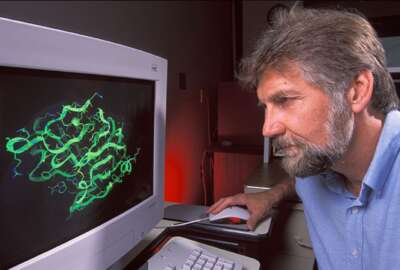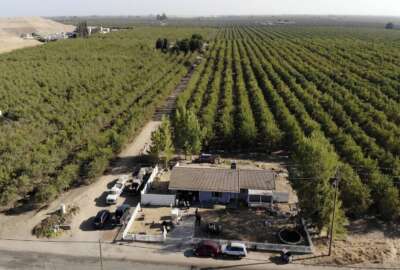Hubbard Radio Washington DC, LLC. All rights reserved. This website is not intended for users located within the European Economic Area.
This USDA entomologist lets bugs do the dirty work of eliminating other bugs
Apple and pear growers in Washington State are using insects instead of chemical pesticides to control other bugs that can ruin crops. It's an old idea, but not...
Apple and pear growers in Washington State are using insects instead of chemical pesticides to control other bugs that can ruin crops. It’s an old idea, but not a practical one, until now. Credit goes to an entomologist at the Agriculture Research Service, who is also a finalist in this year’s Service to America Medals program. Federal Drive with Tom Temin spoke with her: Rebecca Schmidt-Jeffris.
Interview Transcript:
Tom Temin And the idea is that if you can introduce an insect population that preys on the harmful ones, then that can help mitigate the need for pesticides and so forth. But as I understand it, the difficulty is getting those bugs to come on over and move in and start eating what you want them to eat.
Dr. Rebecca Schmidt-Jeffris Absolutely. So there are a lot of challenges, including getting the ones that are already present. Because the nice thing about orchards is they’re open to the environment and a nice, stable ecosystem. So you also want the nice native predators to stay put and live happily in that system, which doesn’t always work with certain pesticides.
Tom Temin Right. And so then how were you able to get this to happen? Tell us what your experiments and what is it about the insects that you needed to discover so that they could be good, you know, move in and say, eat those guys?
Dr. Rebecca Schmidt-Jeffris So one of the really great things about the Washington tree fruit industry in particular is it has this long history of being pretty aware of how certain pesticides can impact natural enemies. So their questions are kind of fundamental as we have these new pesticides that we’re using. Some of them tend to be softer, less harmful to humans in the environment. Which ones are the better choices for our particular group of natural enemies that these past that exist? So we spend a lot of time in my research program figuring out those questions for the predators that are important in that particular system, that are unique to us. And then kind of the new component that we’ve been working on, on top of that is, you know, there are cases where someone has transitioned to organic. Maybe they don’t have as many natural enemies, maybe they’re having a bad year and they need something just to add on top of what they’ve already got going on. So there are and it’s going to surprise a lot of people, beneficial insects that you can purchase online from various companies that raise them. That’s their job is to raise these beneficial insects. So what our growers wanted was, okay, if I go and buy them, which are the best choices for the pest that we have in tree fruit, how many do I put on? It’s got to be economical, so I don’t want to overdo it. When do I put them on? Which pest are they the best to control? And so we are working on answering all of those questions with a series of experiments going on in our grower’s orchard. So just trying to get them that information.
Tom Temin And what are the chief pests that harm apple crops and pear crops?
Dr. Rebecca Schmidt-Jeffris So the big number one that folks will probably be familiar with colloquially as we all we hear about worms and apples. So that is a caterpillar and that’s the caterpillar of the codling moth. So they’re primarily managing that pests with other means either using a very selective chemical program and then also doing a very cool thing called mating disruption, where they basically swarm the orchard with the female pheromones of the codling moth. And it means the male can’t find the female, so she doesn’t have fertilized eggs and there is no caterpillars to get into the fruit. It’s kind of all the other pests that come past codling moth in terms of significance that can be really impacted by biocontrol. So in apples, the big one is a various species of aphids. They’re really problematic because they feed on tree sap. Tree sap has a lot of sugar in it when they, for lack of a better word, poke, they poop directly onto the fruit. You get this nasty streaking because mold will form, because it’s eating that sugar. So you get a really unattractive, sometimes partially rotten apple. And then in pears they’ve got a pest called pear psylla that essentially does the same thing. It feeds on the tree sap and causes really nasty streaking on the fruit. And it’s also not good for the health of the tree.
Tom Temin And that could make for a really bad Thanksgiving set of pies. And is one of the other advantages of using, as you call it, natural or biologic pest control, is that often even when you use gentle pesticides, the bugs adapt and they get immune to it pretty quickly, whereas they never evolve fast enough to not get eaten by the thing that is sent to attack them.
Dr. Rebecca Schmidt-Jeffris Yeah. And one the nice thing about the thing that’s trying to attack them is it also is evolving and we can’t make pesticides naturally change what they are in the field. But predators sure can also evolve and continue to evolve to basically be able to stay alive and eat those pests. So, yeah, this is really just a finding more effective tools that are not chemically based so the grower can rely more on those as opposed to tools that they’re constantly having to cycle out due to lack of efficacy over time.
Tom Temin We’re speaking with Dr. Rebecca Schmidt Jeffris. She’s a research entomologist at the Agricultural Research Service and a finalist in this year’s Service to America Medals Program. And how do you measure the effectiveness of this type of work? For example, if you completely spray a place from an airplane, pretty much you’ll get all the aphids and you’ll get all of the bad bugs that you don’t want. But then you’ve got this big spray and big poison cloud you have to drop. On the other hand, if you release bugs, you can’t be sure they’ll get them all and you’ll have a certain crop loss. So are there metrics to understand what’s going on?
Dr. Rebecca Schmidt-Jeffris That’s a really great question, Tom. So they’re the kind of two parts, one of which my lab is kind of figured out over time, which is a lot of our growers to figure out whether or not it was working, were going back and looking for the thing that it released. Totally makes sense. If I release a lacewing, I want to be able to go find them again. Well, it turns out looking for a little tiny predator in a big tree is pretty hard. So, you know, they’d find a few and go, I know that this works. So really for us, it’s about measuring the levels of the pest and the area that we release these predators and comparing it to an area where we didn’t and seeing what that changes and whether it’s substantial enough that a grower go, Oh yeah, that’s something that I would be interested in doing. On a bigger scale growers consider certain levels of damage to be acceptable because even with a pesticide, you’re not going to get 100% perfect control. So it’s all about what’s the cost of the control mechanism and what’s the point where I’m going to have a yield loss and does that balance to equal profit? So there’s a lot of great work out there to look at this for various pests. And then of course, they’ve got to also do squishy math, which is basically, okay, maybe this isn’t as effective as a kill all pesticide in the very short term, but what’s the long term cost of repeatedly using that pesticide? And is this going to be not beneficial in the end?
Tom Temin Sure. Is there any economic value whatsoever for apples that might be wrecked for human consumption? But can you feed them to hogs or something or squeeze in for cider?
Dr. Rebecca Schmidt-Jeffris Well, a lot of a lot of apples that get really wrecked for human consumption will go into processing. So they’ll, you know, you can use them and things like that. But really it becomes difficult if you’ve got an apple that was intended for the fresh market where the value is higher, to still have that handle labor, go in and pick it and then have it then go into a really low value commodity. So sometimes you end up just not having an orchard that’s really been hit hard like a frost damage incident where there’s only some fruit left, they just won’t have them pick it and unfortunately it goes to waste. The labor is not worth it.
Tom Temin Yeah, well, as an Apple devotee, I hate to see any apple not land right in the right place that it should. Let me ask you this. How did you come to this work? Tell us about your background. And it seems like a fairly important passion in your life.
Dr. Rebecca Schmidt-Jeffris Yeah. So I never expected that I would get into agriculture. I always expected that I would get into something pretty nerdy. I like science. I will always love bugs and other things that people maybe don’t enjoy as much, like snakes and lizards. So I wanted to be, you know, a natural historian. Look at animal behavior. And one of my research advisors, as an undergrad, said, you know, if you really want to get into the nitty gritty and observe things up close and do manipulations, insects are where it’s at because they’re small and people kind of really have a care about them. And there are a lot of programs that look at studying insects, and I just kind of stumbled my way into working in agriculture because of how many people that work in entomology end up finding themselves there. And I ended up really fortunate in that I thought I wanted to study big charismatic predators like cougars and wolves. And I think I studied pretty charismatic but very, very small predators now. So I got what I wanted. But I’m also doing something that really benefits the American public, which really makes me happy kind of in both directions.
Tom Temin And by the way, spiders, is that part of your purview?
Dr. Rebecca Schmidt-Jeffris We do. We do some spider research. It turns out we’re finding out they’re quite beneficial in orchard systems. They do a good job of kind of taking care of a lot of the small, squishy insects that growers do not want in their trees.
Tom Temin All right. Because I’m a fan of spiders. I don’t step on a spider. I don’t step on insects.
Dr. Rebecca Schmidt-Jeffris I try not to I’ve got just a few exceptions of things that are probably not going to get gently escorted outside. But for the most part, all spiders that I find indoors get gently escorted outside.
Copyright © 2024 Federal News Network. All rights reserved. This website is not intended for users located within the European Economic Area.
Tom Temin
Tom Temin is host of the Federal Drive and has been providing insight on federal technology and management issues for more than 30 years.
Follow @tteminWFED
Related Stories
USDA modernizes an important research facility with a whole new building
Related Stories
-
USDA modernizes an important research facility with a whole new building Facilities/Construction





